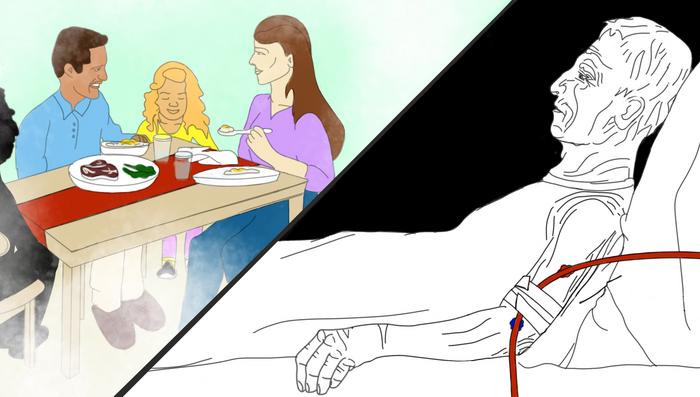Whether dialysis is the best option for kidney failure and, if so, when to start, may deserve more careful consideration, according to a new study.

Credit: Emily Moskal/Stanford Medicine
Whether dialysis is the best option for kidney failure and, if so, when to start, may deserve more careful consideration, according to a new study.
For older adults who were not healthy enough for a kidney transplant, starting dialysis when their kidney function fell below a certain threshold — rather than waiting — afforded them roughly one more week of life, Stanford Medicine researchers and their colleagues found.
More critically, perhaps, they spent an average of two more weeks in hospitals or care facilities, in addition to the time spent undergoing dialysis.
“Is that really what a 75- or 80-year-old patient wants to be doing?” asked Maria Montez Rath, PhD, a senior research engineer.
Montez Rath is the lead author on a study about dialysis, life expectancy and time at home to be published in Annals of Internal Medicine. Manjula Tamura, MD, a professor of nephrology, is the senior author.
“For all patients, but particularly for older adults, understanding the trade-offs is really essential,” Tamura said. “They and their physicians should carefully consider whether and when to proceed with dialysis.”
Patients with kidney failure who are healthy enough for transplantation may receive a donated kidney, which will rid their blood of toxins and excess fluid. But that option is unavailable to many older adults who have additional health conditions such as heart or lung disease or cancer.
For those patients, physicians often recommend dialysis — a treatment that cleans the blood like healthy kidneys would — when patients progress to kidney failure. Patients are considered to have kidney failure when their estimated glomerular filtration rate (eGFR), a measure of renal function, falls below 15.
Patients and their family members sometimes assume that dialysis is their only option, or that it will prolong life significantly, Montez Rath said. “They often say yes to dialysis, without really understanding what that means.”
But patients can take medications in lieu of dialysis to manage symptoms of kidney failure such as fluid retention, itchiness and nausea, Tamura said. She added that dialysis has side effects, such as cramping and fatigue, and typically requires a three- to four-hour visit to a clinic three times a week.
“It’s a pretty intensive therapy that entails a major lifestyle change,” she said.
Lifespan and time at home
The researchers conducted the study to quantify what dialysis entails for older adults who are ineligible for a transplant: whether and how much it prolongs life, along with the relative number of days spent in an inpatient facility such as a hospital, nursing home or rehabilitation center.
The team evaluated the health records, from 2010 to 2018, of 20,440 patients (98% of them men) from the U.S. Department of Veterans Affairs. The patients were 65 and older, had chronic kidney failure, were not undergoing evaluation for transplant and had an eGFR below 12.
Simulating a randomized clinical trial with electronic health records, they divided patients into groups: those who started dialysis immediately, and those who waited at least a month. Over three years, about half of the patients in the group who waited never started dialysis.
Patients who started dialysis immediately lived on average nine days longer than those who waited, but they spent 13 more in an inpatient facility. Age made a difference: Patients 65 to 79 who started dialysis immediately on average lived 17 fewer days while spending 14 more days in an inpatient facility; patients 80 and older who started dialysis immediately on average lived 60 more days but spent 13 more days in an inpatient facility.
Patients who never underwent dialysis on average died 77 days earlier than those who started dialysis immediately, but they spent 14 more days at home.
“The study shows us that if you start dialysis right away, you might survive longer, but you’re going to be spending a lot of time on dialysis, and you’re more likely to need hospitalization,” Montez Rath said.
Tamura noted that physicians sometimes recommend dialysis because they want to offer patients hope or because the downsides of the treatment haven’t always been clear. But the study indicates physicians and patients may want to wait until the eGFR drops further, Tamura said, and should consider symptoms along with personal preferences before starting dialysis.
“Different patients will have different goals,” she said. “For some it’s a blessing to have this option of dialysis, and for others it might be a burden.”
It may be helpful, she added, if clinicians portray dialysis for frail, older adults as a palliative treatment — primarily intended to alleviate symptoms.
“Currently, dialysis is often framed to patients as a choice between life and death,” she said. “When it’s presented in this way, patients don’t have room to consider whether the treatment aligns with their goals, and they tend to overestimate the benefits and well-being they might experience. But when treatment is framed as symptom-alleviating, patients can more readily understand that there are trade-offs.”
*The illustration must be credited Emily Moskal/Stanford Medicine. It may be used only in an editorial manner and not for any commercial, promotional, endorsement, advertising or merchandising purpose. It may be used only in conjunction with a story about the research described in this article.
# # #
About Stanford Medicine
Stanford Medicine is an integrated academic health system comprising the Stanford School of Medicine and adult and pediatric health care delivery systems. Together, they harness the full potential of biomedicine through collaborative research, education and clinical care for patients. For more information, please visit med.stanford.edu.
Journal
Annals of Internal Medicine
DOI
Method of Research
Observational study
Subject of Research
People
Article Publication Date
19-Aug-2024



